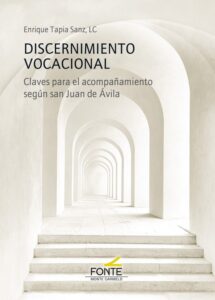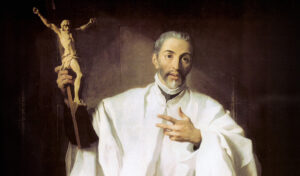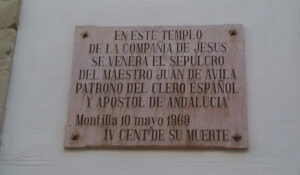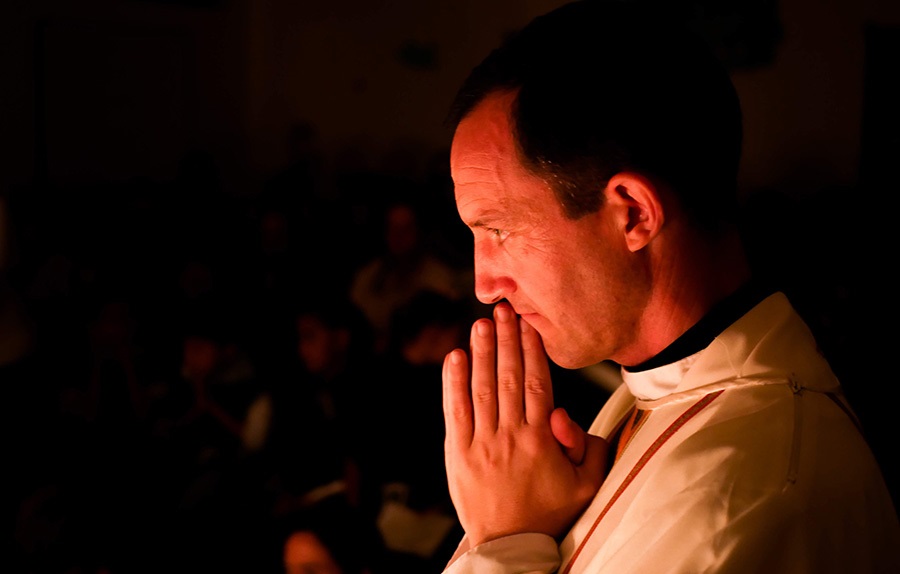 Father Enrique Tapia is a Burgos-born Legionary priest of Christ who directs the Pontifical International College María Mater Ecclesiae in Rome. His previous ministry was as rector of the Legionaries of Christ novitiate in Spain. Father Enrique Tapia has just published a book titled “Vocational Discernment, Keys for Accompaniment According to Saint John of Ávila”, by Monte Carmelo Publishing, which compiles and disseminates part of his doctoral thesis on this very topic. Saint John of Ávila (Almodóvar del Campo, Ciudad Real 1499/1500 – Montilla, Córdoba 1569) is the patron of the Spanish clergy and was declared Doctor of the Church by Benedict XVI. The Office of Communication of the Spanish territory spoke with Father Enrique Tapia about the practical keys his book offers, about Saint John of Ávila, the importance of vocational discernment, and the Legionaries of Christ congregation. We present the first part of this conversation, which will continue.
Father Enrique Tapia is a Burgos-born Legionary priest of Christ who directs the Pontifical International College María Mater Ecclesiae in Rome. His previous ministry was as rector of the Legionaries of Christ novitiate in Spain. Father Enrique Tapia has just published a book titled “Vocational Discernment, Keys for Accompaniment According to Saint John of Ávila”, by Monte Carmelo Publishing, which compiles and disseminates part of his doctoral thesis on this very topic. Saint John of Ávila (Almodóvar del Campo, Ciudad Real 1499/1500 – Montilla, Córdoba 1569) is the patron of the Spanish clergy and was declared Doctor of the Church by Benedict XVI. The Office of Communication of the Spanish territory spoke with Father Enrique Tapia about the practical keys his book offers, about Saint John of Ávila, the importance of vocational discernment, and the Legionaries of Christ congregation. We present the first part of this conversation, which will continue.
“Vocational Discernment. Keys for Accompaniment According to Saint John of Ávila” has become the best-selling book during November from Monte Carmelo Publishing and has been reviewed in various specialized magazines, such as Vida Nueva. It addresses one of the central themes of priestly formation, so, in the words of Monsignor Jorge Patrón Wong, Secretary for Seminaries of the Holy Congregation for the Clergy, “this book by Father Enrique Tapia, LC offers a valuable contribution to formators of seminarians and consecrated persons in order to carry out good vocational discernment and the processes of selection and formation of candidates.”
San Juan of Ávila, Father Enrique Tapia recounts, “is a little-known figure, but figures like Saint Teresa of Ávila, Saint Ignatius of Loyola, Saint John of God, and other saints sought his advice or recognized his authority in spiritual life.” In fact, “Menéndez Pelayo considered him the most consulted man of his time, and we are talking about the Spanish Golden Age,” explains Father Enrique Tapia. He was a moral and spiritual authority to such an extent that Pope Benedict XVI named him Doctor of the Church.
And what does Saint John of Ávila contribute to us? Is there new doctrine?
It’s not that he offers new doctrine in our time (yes, in the 16th century), but what he does is provide approaches, keys to do this work of discerning a vocation well. On the other hand, many teachings from the Second Vatican Council on vocation and priestly formation, this man was already saying in the 16th century. In other words, he is a precursor. There are things that seem obvious, but in his time they were not. He had a special gift from God to see things clearly: he speaks on topics such as freedom, human maturity, prayer life… important themes for vocational discernment.
Father Enrique Tapia, then, what does your teaching contribute to our time on the subject of vocational discernment?
We must consider his era, the first half of the 16th century, to understand the Church of his time and the greatness, richness, and prophetic nature of his teaching through preaching, letters, reflections, etc. He was not a teacher in the academic sense, but his teaching is distilled from his pastoral action. Today we understand clearly that to be a priest, one must go to a seminary, but in his time, it was not like that. The Council of Trent decreed that bishops must establish seminaries in their dioceses; the influence of Saint John of Ávila on this decision of the Council is recognized by experts. This would be one of his main contributions: the need to select and properly form candidates for the priesthood, and to do so in a college or seminary (cf. Annex 1, with some texts from Saint John of Ávila).
And regarding the spiritual dimension of candidates for the priesthood or consecrated life? What does this saint say?
 Saint John of Ávila holds and defends a high concept of the priestly and consecrated vocation. What he affirms is that vocation comes from God, meaning it is not a human choice in its initiative; it is not a way to earn a living… This is something Pope John Paul II also said in 1992 in Pastores dabo vobis.
Saint John of Ávila holds and defends a high concept of the priestly and consecrated vocation. What he affirms is that vocation comes from God, meaning it is not a human choice in its initiative; it is not a way to earn a living… This is something Pope John Paul II also said in 1992 in Pastores dabo vobis.
Other elements of particular relevance in Saint John of Ávila include the importance he gives to prayer. He spoke a lot and clearly about this, something also reflected in Pope John Paul II and the Magisterium of the 20th century (see annex 2). And, of course, pastoral charity (see annex 3).
He has cited some aspects of Saint John of Ávila that are also very necessary today, such as maturity or the selection of candidates…
Indeed, Ávila emphasizes the importance of human maturity. He does so by indicating the age for entering the seminary or becoming a priest: he speaks of at least 30 years old, and on the other hand, he advocates for a long trial period for candidates before assuming definitive commitments, both in ordination and in perpetual vows. This is something that the Second Vatican Council and the Popes of the 20th century—especially from Pius XII onward—have insisted on greatly.
And as you point out, initial selection of candidates for religious life or the priesthood is also fundamental for him. Saint John of Ávila advocates for choosing well at the start those entering the seminary so that the formation offered there can bear good fruit. Something that has been recently and especially emphasized in the Ratio of Formation of the Clergy of 2016 (n. 60, n. 189).
Father Enrique Tapia, these things you mention seem obvious, but were they really not so five centuries ago?
We return to what we discussed earlier. Pope Benedict XVI in 2012 named Saint John of Ávila Doctor of the Church, and when the Church names someone Doctor, it recognizes several things in that person. The first is his holiness, meaning he must be canonized, and then that his doctrine is of an eminent degree, meaning it stands out. In fact, there are few: only 36 Doctors in the Catholic Church (including men and women).
Returning to the topic of vocation, it is often discussed as a call to the priesthood and consecrated life. And laypeople seem to be “called to nothing.” Is that so?
 No, definitely not. We start from the principle that life is a vocation, and that there are various levels of vocation, of God’s call to fulfill a particular plan.
No, definitely not. We start from the principle that life is a vocation, and that there are various levels of vocation, of God’s call to fulfill a particular plan.
First, we can speak of the vocation to being, that is: God creates us and calls us to being from non-being. He calls us to exist as human beings. This is in a natural order, but there is also a vocation to be children of God, that is: God calls us to participate in divine life, in His love, to live in communion with Him. This is the vocation to holiness, and it is of a supernatural order.
And finally, there is a concrete vocation that is specifically expressed in each person. And this is that of priest, religious, married… And in this sense, all of us, not only candidates for priestly or religious life, must undertake a vocational discernment.
Next, we offer some texts selected by Father Enrique Tapia, LC, to understand firsthand the thoughts of Saint John of Ávila.
Annex 1
Texts on the need to properly form future priests and that the unworthy are not ordained
- “What a great shame it is that, not allowing an officer in the republic who has not first learned his craft, we allow in the Church a minister who has never learned to be one! […] Young men raised for the Church, not because they were called by God or their prelates, but because, when they were born, their parents deputed them for the Church, or after birth, for titles of chaplaincy of their lineage; or because they needed to eat, they themselves chose the ecclesiastical state—these, raised in pernicious freedom, without teachers, without virtuous retreat, with youthful fervor and amid worldly occasions, knowing no law but their bad appetite, how can they suddenly become skilled for the dignity of the priesthood, which angels admire and tremble at if they exercised it? […] What can be expected from such bad roots but the bitter fruits we see and hear, which make the holy Mother Church weep and the Christian name be dishonored because of infidelity?” (First Memorial to the Council of Trent, no. 10).
- “What we have seen used, due to our sins, near entering the ecclesiastical state, is to take it, as we said above, as a matter of duty and to have something to eat without work, being called by money and gifts and not by God. And, entering thus, not through the door but through the bardo (cf. Jn 10:10), what else can they do but kill and ruin, like thieves, since, according to the entrance, life is often the same as the exit? Who doubts that the blood of the souls of the Christian people is shed by bad works and bad words and by the negligence of bad ecclesiastics? […] The cause of this evil is men unworthy in the Church and entry through the false door. Close this very bad entrance, and its evil effects will cease” (First Memorial to the Council of Trent, no. 16).
- The solution was that ecclesiastical life be ordered in such a way “that only the virtuous or those striving to be so can carry it out […] those who truly want to be so.” And “only those who want to have God as their part, as Hieronymus says, should be admitted to the clerical state”; “it is better to choose few and such that none need to be rejected, than to open the door to anyone who is burdensome to others, and it is necessary to dismiss or ordain the unworthy” (First Memorial to the Council of Trent, no. 6 and 18).
- Those who are to be ministers of the Church must be: “Virtuous persons […] in whom it is probable that the grace of the Lord dwells, and who are inclined to the things of the Church, who know how to fight the battles for chastity and achieve victory in them, and who have experience of prayer or are willing to learn and have the disposition to do so” (Second Memorial to the Council of Trent, no. 91).
- After this selection, rigorous and demanding formation is necessary. It is said that if the Council of Trent wants “the Church to be terrible as an organized army,” besides colleges where candidates for priests and confessors are formed, it must provide colleges to form “very learned readers and preachers,” because this office “requires greater holiness,” “to produce men who are the light of the world, salt of the earth, and glory of Christ” (First Memorial to the Council of Trent, no. 15).
Annex 2
On the life of prayer
- John of Ávila on the priest’s prayer: “from the doctrine of the saints and divine Scripture it seems that the priest’s duty, as we have said, is to pray for the people” (Second Talk to Priests, no. 10). Citing Saint Gregory the Great, he affirms that anyone who does not have experience of the gift of prayer within himself should not exercise the care of souls (Third Talk, no. 51). The priest’s mission demands the “gift of prayer, and a very great one” (Treatise on the Priesthood, no. 11).
- Pope John Paul II.
- “An aspect, certainly not secondary, of the priest’s mission is to be a master of prayer. But the priest can only form others in the school of Jesus praying if he himself has been formed and continues to be formed in that same school […]. Christians expect to find in the priest not only a man who welcomes them, listens to them gladly, and shows sincere friendship, but also and above all a man who helps them to look at God, to ascend toward Him” (PDV 47).
- Referring to consecrated persons, “they must possess a profound experience of God” (VC 73).
Annex 3
On pastoral charity
Vatican II speaks of pastoral charity as the perfection of the priesthood (PO 14). Jesuit Manuel Ruiz Jurado questions in 2013 whether today many formators sufficiently consider this aspect when making good vocational discernment for those under their care. Saint John of Ávila was very clear about this. Two texts:
- “If there is no goodness, what use is knowledge, or good practice, or prophecy, or even performing miracles? For, although one has all these, if charity, which makes a man good, is lacking, Saint Paul boldly proclaims: Nihil sumus (cf. 1 Cor 13:2)” (Second Talk to Priests, no. 3).
- The priest must be “a true father and a true mother” (Treatise on the Priesthood, no. 39) to those in his charge. Words that remind us of Pope Francis when, addressing consecrated persons, he urged them not to be spinsters or old maids, but true spiritual mothers and fathers.
Annex 4
On freedom
- Ávila criticizes the custom of some parents, unable to pay the dowry required to marry off their daughters, to send them to nuns “even if they do not want to be one,” “against their will.” This – he affirms – is a “great tyranny” (Second Memorial to the Council of Trent, no. 90 and 95).
- For Ávila, those who truly want to be priests will be “the ones who really want to be so.” And “only those who want to have God as their part, as Hieronymus says, should be admitted to the clerical state” (First Memorial to the Council of Trent, no. 6).










